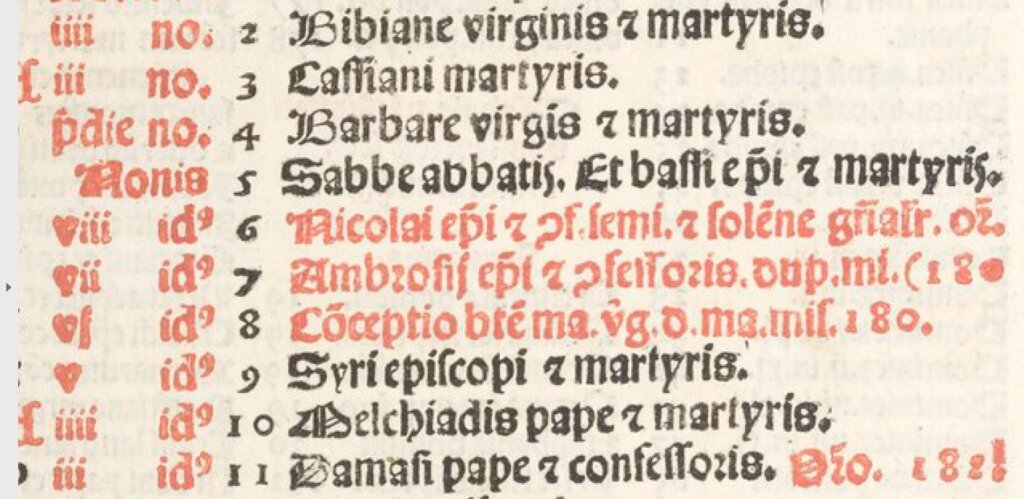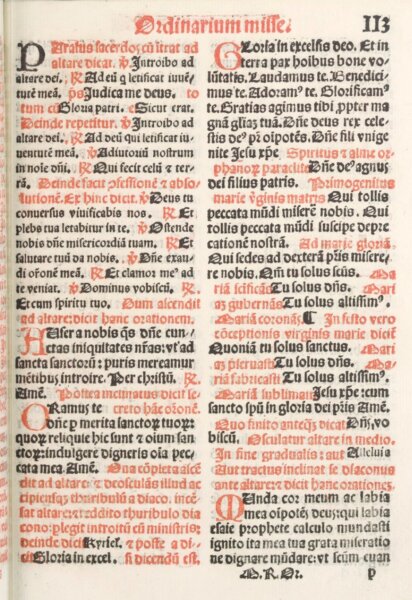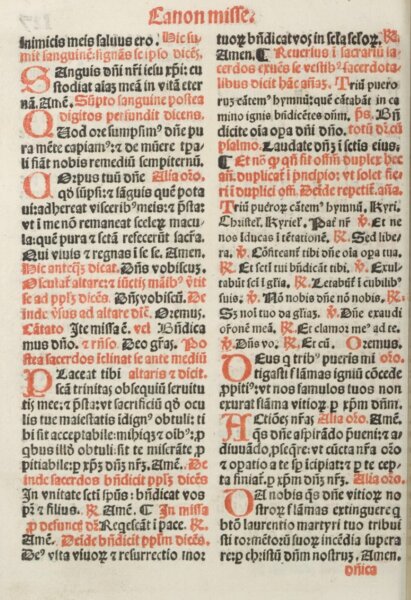'Where Peter Is' is at it again! '[A]nti-traditionalists do us a service by demonstrating that they know practically nothing about that of which they speak—and care even less to find out.'
From One Peter Five
By Peter Kwasniewski, PhD
A website that appears to be dedicated to continually lowering the “low-water” mark for the Catholic press has truly outdone itself by publishing a clumsy farce of the Ottaviani Intervention, re-imagined as a piece from 1570 objecting to the “reform” of Pius V: “Contents of secret liturgical document revealed!”
Every claim made in the farce is itelf farcical: a series of talking points from the 60s, as easy to explode as a balloon with a pin. As Gregory DiPippo always says (and I gratefully acknowledge his assistance in preparing this article), the anti-traditionalists do us a service by demonstrating that they know practically nothing about that of which they speak—and care even less to find out. We saw the same with Cavadini, Healy, and Weinandy, who repeat the shallow talking points of Francis, Roche, Cupich, and Cantalamessa, who in turn regurgitate Jungmann, Vagaggini, Bugnini, McManus, et al. Truly, nothing new under the sun, at least in this particular subculture.
This cack-handed attempt at satire pretends to be a critique of the 1570 Missal, written contemporaneously, as an “unprecedented break with tradition.” Here are some of the points made by the would-be Ottaviani of the sixteenth century:
- “Firstly, there is the extraordinary novelty of taking from the bishops their time-hallowed right of regulating the liturgy. What precedent can there be for the Roman See exercising such powers?”
Of course, the author has no idea that Quo Primum did what it did because, as Fr Hunwicke has pointed out any number of times, the printing press gave Their Excellencies unprecedented latitude to mess with the liturgy by inserting novelties into printed editions of their various sees’ liturgical books. In other words, the centralizing move of Pius V was a way of preventing the bishops from filling the liturgy with novelties. It was a decisive step against novelty and a decisive blow for the Roman tradition.
- “Quo Primum deprives the liturgy of its wonderful diversity and variety of expression.”
Of course, the author has no idea that Quod a Nobis and Quo Primum explicitly do not abolish (“nequaquam tollimus”) those liturgical Uses which had a pedigree of 200 years, and also, that there was no enforcement mechanism; so, no, it did not “deprive the liturgy of its wonderful diversity and variety of expression.”
- “The reformers claim to be acting according to the guidelines of the Council of Trent, though one wonders if the Fathers of that assembly would recognize the revision as their work.”
Of course, the author has no idea that Trent issued no guidelines at all, but simply said that the correction and publication of new editions of the liturgical books was a matter to be left entirely to the discretion of the Holy See.
- “Likewise the abrogation of all but four of the sequences.”
This sentence alone serves to establish that the author has taken no trouble to learn even the most rudimentary facts about the Pius V reform (see “What Really Happened to the Sequences?”) The missal of the Roman curia, being rather conservative, had never featured the proliferation of Sequences that found their way into other Uses. It had, prior to Pius V, exactly the four that Pius V’s missal retained. One might regret that, as a result of the prestigious Roman Church’s traditional missal being taken up in so many places, local Sequences were lost as collateral damage, but in no sense did Pius V “abolish” them.
- Because he that is faithless in the lesser things is also faithless in the greater, he repeats the standard calumny against ALL of the Churches of the East, by saying that “(t)he peculiarity of offering the ‘unspotted host,’ which is still bread, is of course done in anticipation of what it will become…”
This is NOT a peculiarity; it is a universality. For example, the three Cherubic hymns of the Byzantine Divine Liturgy, sung during the Great Entrance, refer to the transport of the bread and wine from the table of the proskomidion as the “coming of the King.” Would these WPI reformist vandals dare say that they must all be abolished, because they anticipate the consecration, and “confuse the faithful”? Would they insist that the Byzantine preparation of the gifts prior to the public start of the liturgy, a ceremony that treats them as a sacrificial victim, be abolished? They probably would!
As Matthew Hazell has rightly noted, when the real vandals of the Consilium went rifling through historical rites and records to find some prayers for the Offertory rite that did NOT anticipate the consecration, they were unable to find any. Eventually they had to concede that anticipation (or, to use the technical term, “prolepsis”) is a universal feature of the Offertory. The stupidity of the change which they did make, adding Jewish blessing prayers that have nothing whatsoever to do with the Christian tradition, was realized by the time the Ambrosian Rite was reformed some years later, and although its offertory is much reduced, it has nevertheless retained real offertory prayers. Likewise the Anglican Use, in which the traditional Roman Offertory prayers are included ad libitum.
- “The Canon of the Mass might have been revised too, to better reflect the teaching of the Council Fathers concerning the Mass. Instead, a number of ambiguities become evident, which, though orthodox in context, become ambivalent in the light of recent heretical assaults.”
Putting these words in the mouth of a Catholic writing in the 1570s is not a satire; it’s an obscenity. It assumes that the vandals of the 1960s Consilium were basically correct, and that every time we have an ecumenical council we need to (get to?) re-write the liturgy to reflect what it has just recently said. This is, needless to say, part and parcel of the defense of the Great Indefensible made by Cavadini, Healy, Weinandy, and others, and plays in very nicely with recent attempts to pervert the idea of “development of doctrine” into “total overthrow of doctrine.” But it has nothing to do with Catholicism per se. In reality, the inherited liturgy was always a norm for the councils, not a casualty of them.
(Here’s your periodic reminder that there’s an easy-to-read book, often humorous in style, that responds to this sort of nonsense: Illusions of Reform.)
- “All but 149 feasts or commemorations have been abolished or transferred from their traditional dates.”
Here the author demonstrates his ignorance of one of the most basic facts of liturgical history. In the transition between pre-and post-Tridentine editions of the liturgical books, transfers of date were very rare. He is clearly unaware of the fact that the calendar of the Breviary of 1568 and the Missal of 1570 was the very first of its kind, created to serve as a baseline and to be used outside of its diocese of origin. As such, it was always understood that local churches would continue to celebrate their local feasts on their traditional dates. A comparison between it and any pre-Tridentine calendars, based on the raw number of feasts alone, is a classic apples-and-oranges fallacy.
- “The most astonishing alteration is for December 8, which is no longer the Feast of the Immaculate Conception but simply of the Conception.”
Yes: exactly as it was in PRE-Tridentine Roman Missals. But why bother to look at one of those when you’re writing something like this? Here is a picture of a Missale Romanum printed in Venice in 1521, with “Conception” as the title of the feast on Dec. 8, and no “Immaculate”:

- “And the Mass of the Nativity of Mary has been substituted for the proper Mass composed in the last century.”
No, it hasn’t; with one small editorial change, the Mass of September 8 is exactly the same in the pre- and post-Tridentine editions. The author may have just made this claim up, as defenders of the postconciliar rite are in the habit of doing. He may have looked for a pre-Tridentine Missal on Google books and found one with a different Mass for September 8—possibly even one into which some Excellency somewhere had introduced one of the novelties that St Pius V was trying to get rid of, and then, understanding nothing of its origin or content, proceeded to make this false claim. The most likely scenario is that someone else made the claim, and he copied from that book without verifying it.
- “We note too that the feast of the Virgin’s parents has been suppressed altogether.”
Finally, one legitimate observation. Yes, this was a mistake, based on too strict a desire to exclude feasts derived from apocryphal sources—a mistake that was rectified in part by Pius V’s own successor, Gregory XIII, in 1584 (St Anne), in part by Sixtus V the following year (the Presentation), and in part by Gregory XV in 1622 (St Joachim). Why was this move quickly reversed? Because the cranky Trad who pointed out that this was too violent a disruption of popular piety and should not have been done was right, even as the cranky Trads are right today (regardless of their crankitude). Showing, incidentally, that no change is “irreversible”—including Paul VI’s work and Francis’s doubling-down on it.
On the other hand, we should not fall into an ahistoricism by asserting that the missal of 1570 was in every respect identical to every missal before it. There were small differences between the Missal of St Pius V and its predecessors. These differences are negligible in number and scope compared with the profusion and extent of the differences between the Novus Ordo and all preceding Western rites. Let’s consider two of them.
Here is a page from a Roman Missal printed in 1521 with a popular troped “Gloria in excelsis” for Marian feasts. (A troped text is one in which the original prayer has been embellished with devotional or theological extra phrases.)

The reform of St. Pius V, in keeping with the desire to present to the Church a solidly Roman missal backed up by centuries of exemplars, did away with the tropes. One might regret that; one might even (in healthier times) have petitioned Rome for permission to use certain tropes again, once the Protestant threat to liturgical integrity had passed. But in no sense could one call this either an innovation or an archaicism (that is, a reaching-back to some little-known and re-imagined ancient practice).
A second example: the last page of the 1521 Ordo Missae does not include the Last Gospel. Before St Pius V’s Missal, the reading of the Last Gospel was very widespread but not yet universal, even among those churches and religious orders which had adopted the Use of the Papal Court on which the Missal of St Pius V depends. Pius V is the one who made the custom of reciting the Prologue at the end of Mass (which was itself seen as a blessing for those over whom it was read) universal.

Joseph Ratzinger said, more than once, that one should not speak of a “Tridentine Mass.” His point was not that there were no minor differences between the rite before and after St Pius V (we have just given two examples), but that the rite remained so similar that the term “Tridentine” is a terrible misnomer, as it implies that the rite originated with the publication of St Pius V’s Missal. In reality, nearly all of what may be found there was already solidly in place long before 1570.
As one commentator noted: “In order for this satire to be funny or even make sense, it would have to point back to the irony of actual critics of Pius V’s missal arguing these things back in 1570 when Trads now defend the same missal. But obviously there was nobody in 1570 arguing that the Pian missal was in any sense a break with tradition. Trying to say that the Ottaviani Intervention would have been like this fails because the very fact that there were no such interventions in 1570 itself proves how different the two Missals are.”
Where does this leave us?
It is important to remember that WPI takes no actual interest in the substance of any issue whatsoever. This was made excruciatingly clear when they made common cause (also on a liturgical matter) with a writer from Church Militant, whose chief spokesman has prominently and repeatedly attacked and denounced their supposed hero Pope Francis in the harshest possible terms.
As the redoubtable Dr John Lamont recently noted in his series of articles on Rorate Caeli about Fr Henry Donneaud, these people write these things as a way of marking out their enemies for ostracization and mistreatment. It is nothing more than a form of bullying, and does not arise from any interest in the issues. That is why the people who write such apologiae for the postconciliar rite always rely on the same combination of suppressio veri and suggestio falsi—not speaking the whole truth, and suggesting falsehoods—and never bother to do even the most rudimentary research into the facts of the case. They do not care about the facts of the case.
It goes without saying that this kind of shabby treatment is symptomatic of the treatment of Trads in general and has been for over nigh on sixty years. We should not expect fairness or charity from our ideological opponents. Rather, we should do our part, patiently, zealously, and tirelessly, to expose their ignorance, refute their errors, and uncover their agendas.
No comments:
Post a Comment
Comments are subject to deletion if they are not germane. I have no problem with a bit of colourful language, but blasphemy or depraved profanity will not be allowed. Attacks on the Catholic Faith will not be tolerated. Comments will be deleted that are republican (Yanks! Note the lower case 'r'!), attacks on the legitimacy of Pope Leo XIV as the Vicar of Christ, the legitimacy of the House of Windsor or of the claims of the Elder Line of the House of France, or attacks on the legitimacy of any of the currently ruling Houses of Europe.